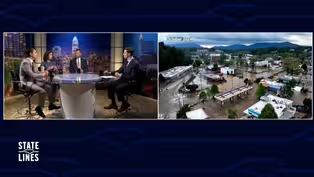
Western NC Cleanup Efforts After Hurricane Helene
Clip: Special | 5m 2sVideo has Closed Captions
Cleanup efforts in western NC after Hurricane Helene, plus the environmental impact of the storm.
Sen. Tim Moffitt (R-District 48), Rep. Lindsey Prather (D-District 115) and Rep. Jake Johnson (R-District 113) discuss western NC eight months after Hurricane Helene, from cleanup efforts to the environmental impact of the storm. Host: PBS NC’s David Hurst.
Problems playing video? | Closed Captioning Feedback
Problems playing video? | Closed Captioning Feedback
State Lines is a local public television program presented by PBS NC

Western NC Cleanup Efforts After Hurricane Helene
Clip: Special | 5m 2sVideo has Closed Captions
Sen. Tim Moffitt (R-District 48), Rep. Lindsey Prather (D-District 115) and Rep. Jake Johnson (R-District 113) discuss western NC eight months after Hurricane Helene, from cleanup efforts to the environmental impact of the storm. Host: PBS NC’s David Hurst.
Problems playing video? | Closed Captioning Feedback
How to Watch State Lines
State Lines is available to stream on pbs.org and the free PBS App, available on iPhone, Apple TV, Android TV, Android smartphones, Amazon Fire TV, Amazon Fire Tablet, Roku, Samsung Smart TV, and Vizio.
Providing Support for PBS.org
Learn Moreabout PBS online sponsorship- Senator Moffitt, Representative Johnson, you both represent that area where Lake Lore is.
Representative Johnson, I'll start with you.
What goes through your mind when you see those images and hear those perspectives?
- One, how long are we really looking at here?
'Cause as they mentioned in the video, it's not just what you see, it's what you don't.
And when you talk about Chimney Rock being above it there, and if you look at the images from Chimney Rock, there's nothing left there.
In a lot of areas, that is completely gone.
There was only one place for it to go, and that's into the lake.
So you don't only have the floating debris that you see what's below the surface.
And what was really so frustrating for us was the timeline that it took to get that approved on the subsurface debris removal.
They were out there working, and that was good to show progress, but the frustrating part for us is if you've already got the equipment out there, you're already on the ground, why can't we just go ahead and get it at the same time?
What you're waiting on are those work orders to come down and that sign off from FEMA that they will reimburse that work.
When that doesn't happen, it puts the contractors in a really bad position when they're gassed up and ready to go.
- And Senator Moffitt, same experience for you?
- For the most part, yeah.
I would like to touch on a couple of things that my colleagues have spoken about.
I think one of the frustrating things for us is time is of the essence to us, time is of the essence to our neighbors, to our small businesses up in the area, and the pace of government is woefully too slow.
It seems like we can make appropriations to foreign countries much easier with far less accountability than we can make appropriations to take care of our own people.
To Representative Prather's point, yes, we need the federal government.
We need all hands on deck at the federal level to help us recover from this because this is greater than any state can recover from on its own, certainly any community.
But the length of time that it takes, the amount of red tape, the frustrating process that our people are put through is really unacceptable to me.
And this is where we need to focus our efforts on preventing this type of thing from further victimizing people in our state in the future.
Again, one of our oversight committees, I made the comment that I honestly felt like this was the first disaster that ever hit our state because none of these processes were up and running.
You could not stand anything up.
So those of us in the mountains are working very diligently on trying to create a resilient process that we can deploy in the future to help our folks.
- And in more of an urban area, Representative Prather, you represent Buncombe County, obviously Asheville.
Is that need the same as it relates to cleanup that you're seeing?
- Absolutely.
Yeah.
So, you know, there was a wide range of impacts on Buncombe County.
A lot of the area that I represent is rural.
Some of those places were hit hard and some of those places weren't.
I also represent parts of Swannanoa that was hit very, very hard.
I'm sure most people in North Carolina know that town's name now.
And you know, I think a lot of people didn't realize the emotional impact that all the debris would have.
Even when it feels like you're making headway and getting a lot of the debris out, when it's still there, you see it every day.
People see it every day when they leave their house, and when they go to work, and it's just a daily reminder that it's gonna be a long time to recover from this.
And I absolutely agree on, you know, speed is important.
We have got to work quickly.
And it's one of the reasons that I really hope that the Senate will take up this recovery bill separately from the budget so that we can get that money on the ground to folks who need it.
- And Representative Johnson, looking forward, we obviously still have a disaster we're dealing with eight months later, but looking forward to future natural disasters, what have we learned from this storm that we can implement in the future?
- Well, I think one, the immediate response time to this was an issue where we were at.
A lot of the assets we have in the state are in the eastern part of the state.
That's just where they're housed at.
When we know a storm is coming, we need to have those assets closer to the impacted areas.
Now, I understand it doesn't make sense to put them on the ground if they're gonna get taken away with the storm, but we have to be staged in a way that makes more sense and it doesn't take days to get response in some of these areas.
On the long term, I think we've actually set some good things in motion in this latest bill that we have, for instance, I'll say the constituent portal that we're fighting for very hard.
That if I'm a constituent in my district, that my house was destroyed, my business was lost, and maybe I need assistance from one or two different federal agencies, where do you start?
I mean, when you're cleaning up your personal life, how do you start in knowing how to navigate state and federal government?
This constituent portal is gonna be a one-stop shop to say, "I need this, this, and this."
And it'll direct you to all those, and it'll have the forms already there.
That you fill them out, it submits it for you, and you go ahead and get in the queue to receive assistance instead of it taking weeks to months to even figure out what that process looks like.
U.S. Rep. Chuck Edwards on Western NC After Hurricane Helene
Clip: Special | 5m 35s | U.S. Rep. Chuck Edwards (R-NC) talks about western NC eight months after Hurricane Helene. (5m 35s)
Western NC’s Economic Outlook After Hurricane Helene
Video has Closed Captions
Clip: Special | 6m 38s | Western NC’s economic outlook after Helene, plus state and federal funding of recovery efforts. (6m 38s)
Providing Support for PBS.org
Learn Moreabout PBS online sponsorship
- News and Public Affairs

Top journalists deliver compelling original analysis of the hour's headlines.

- News and Public Affairs

FRONTLINE is investigative journalism that questions, explains and changes our world.












Support for PBS provided by:
State Lines is a local public television program presented by PBS NC

